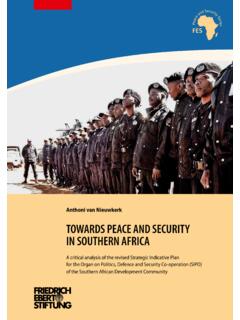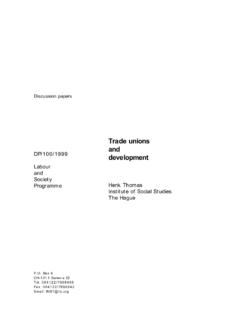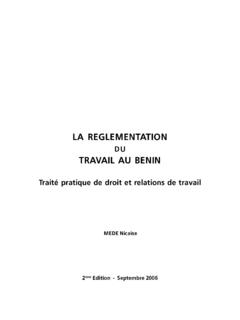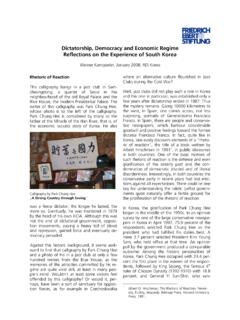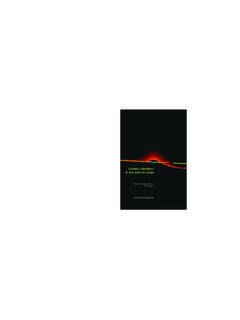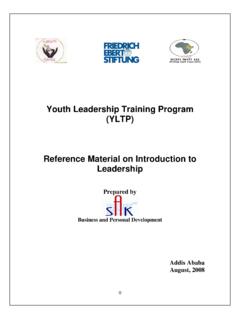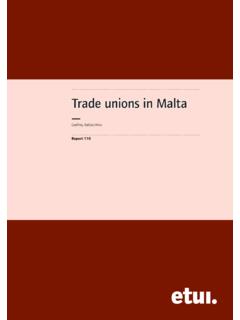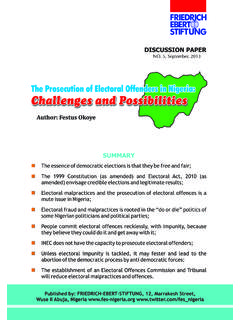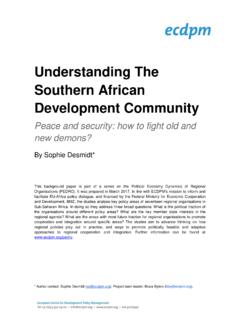Transcription of The role of SADC in managing political crisis and …
1 Gavin CawthraThe Role of SADC in managing political crisis and conflictThe Cases of Madagascar and ZimbabweFESP eace and Security SeriesImprint:Published by Friedrich-Ebert-Stiftung MozambiqueAvenida Tom s Nduda 1313, Maputo, MozambiqueTel.: +258-21-491231, Fax: +258-21-490286 Email: Friedrich-Ebert-Stiftung 2010 The material in this publication may not be reproduced, stored or transmitted without the prior permission of the copyright holder. Short extracts may be quoted, provided the source is fully acknowledged. The views expressed in this publication are not necessarily the ones of the Friedrich-Ebert-Stiftung or of the organization for which the author works.
2 ABOUT THE AUTHOR Professor Gavin Cawthra holds the Chair in Defence and Security Management at the Graduate School of Public and development Management (P&DM) at the University of the Witwatersrand, South Africa. He is a former Director of the Graduate School of Public and development Management, and was previously co-ordinator of the Military Research Group, Director of the Committee on South african War Resistance, and Research Officer at the International Defence and Aid Fund (UK). Gavin Cawthra holds a PhD from King s College, University of London and a BA Honours (cum laude) from the University of Natal.
3 He has published eight books as well as numerous journal and other articles, and his publications have been translated into several languages. The books he has written include: The Apartheid War Machine; Namibia: the Facts; Policing South Africa and Securing South Africa s Democracy. Having spent many years in exile during the apartheid period, he was active in the liberation movement, specialising in research into security issues. He has lectured in more than 20 countries in Africa and wider afield and has received a number of international scholarships, research grants and awards.
4 A consultant to government, NGOs and international organisations, Professor Cawthra lectures at the Graduate School of Public and development Management in policy studies and security studies, convenes a master s degree in management of security and is director of research at the School. Gavin CawthraThe Role of SADC in managing political crisis and conflictThe Cases of Madagascar and ZimbabweCONTENTSACRONYMS AND ABBREVIATIONS 6 Executive Summary 7 Introduction 9 The southern african development community 10 THE MADAGASCAR crisis 13 Background 13 Causes and the nature of the conflict 15 Actors and their interests 17 The role of SADC 19 Prospects and recommendations 21 THE ZIMBABWE crisis 24 Background to the crisis 24 Causes and the nature of the conflict 26 Actors and their interests 27 The role of SADC 29 Prospects and recommendations 31 CONCLUSION 34 List of interviews and meetings
5 35 Madagascar 35 Zimbabwe 35 References 36 Acronyms and abbreviations AGOA african Growth and Opportunity Act (USA)ANC african National Congress (South Africa)APSA african Peace and Security ArchitectureAU african Union CIO Central Intelligence Organisation (Zimbabwe)COMESA Common Market for Eastern and southern Africa COSATU Congress of South african Trade Unions DRC Democratic Republic of CongoFES Friedrich-Ebert-StiftungFLS Front Line StatesFRELIMO Front for the Liberation of Mozambique GPA Global political Agreement (Zimbabwe)HTA High Transitional Authority (Madagascar)ICG International Contact Group ICP International Cooperating Partner (of SADC)IG Inclusive Government (Zimbabwe)IPDSC Interstate Politics and Diplomacy Committee (SADC)ISDSC Interstate Defence and Security Committee (SADC)JOC Joint Operations Centre (Zimbabwe)LDC Least developed country MCND Military Council for National Defence (Madagascar)MDC Movement for Democratic Change (Zimbabwe) MDC-M Movement for Democratic Change Mutambara (Zimbabwe)
6 MPLA Popular Movement for the Liberation of Angola OAU Organisation of african Unity OIF Organisation Internationale de la Francophonie (International Organisation for the Francophone) OPDSC Organ on Politics, Defence and Security Cooperation (SADC )PF-ZAPU Popular Front Zimbabwean african Patriotic Union PSC Peace and Security Council ( african Union)SADC southern african development CommunitySADCBRIG southern african development community Brigade SADCC southern african development Coordination ConferenceSADSEM southern african Defence and Security ManagementSIPO Strategic Implementation Plan for the Organ (SADC)SWAPO South West african People s Organisation (Namibia)TIM Tiako-I-Madagasikara (Madagascar)
7 UN United Nations ZANU-PF Zimbabwean african National Union Patriotic Front 7 Gavin Cawthra | The Role of SADC in managing political crisis and conflictExecutive Summary This study concerns itself with two case studies of the southern african development community s (SADC) involvement in regional crises Zimbabwe and Madagascar. The evolution and structure of SADC s security management and conflict transformation bodies are examined as a background to the two studies. The Madagascar case examines the backdrop to the current crisis , which began in early 2009, tracing a history of periodic political upheavals and military interventions, to the point in 2001 when Marc Ravalomanana established his grip on presidential power, using his position of mayor of Antananarivo and his business empire as power bases.
8 However, his power began to be challenged in 2008 when Andry Rajoelina, another businessman, became mayor of Antananarivo, and this challenge, based on popular protests in the capital, eventually led to Ravalomanana departing office after a military intervention. The study examines how SADC and the african Union (AU) reacted strongly to this unconstitutional change, and how SADC set itself up as one of the principal mediators in an international coalition, eventually leading to an agreement for a transitional government. However, Rajoelina did not honour this agreement, leaving Madagascar in an ongoing situation of crisis .
9 The case study concludes that there were no major ethnic, political or social causes for the crisis , and that Madagascar s dependence on international aid gives the international community considerable influence over the course of events. SADC was able to act decisively because of its policies opposing unconstitutional changes of government, and its lack of economic and other interests in Madagascar. The Zimbabwe crisis is traced back to the breakaway from the ruling Zimbabwe african National Union - Patriotic Front (ZANU-PF) of the Zimbabwe Congress of Trade Unions, leading to the formation of the opposition Movement for Democratic Change (MDC) and the subsequent loss of a constitutional referendum by ZANU-PF and President Robert Mugabe in 2000.
10 This led to a period of political stalemate, increasing state repression and political violence and hyper-inflation, in part caused by a land distribution programme which saw most white commercial farmers dispossessed of their land. SADC was much more reluctant to intervene in Zimbabwe than Madagascar, agreeing publicly with Mugabe that the crisis was a result of the need for land redistribution and caused by Western sanctions. However eventually mediation by President Thabo Mbeki of South Africa resulted in a Global political Agreement in which Mugabe retained the presidency but the main opposition leader, Morgan Tsvangirai, was appointed prime minister and dual executive power was established.
